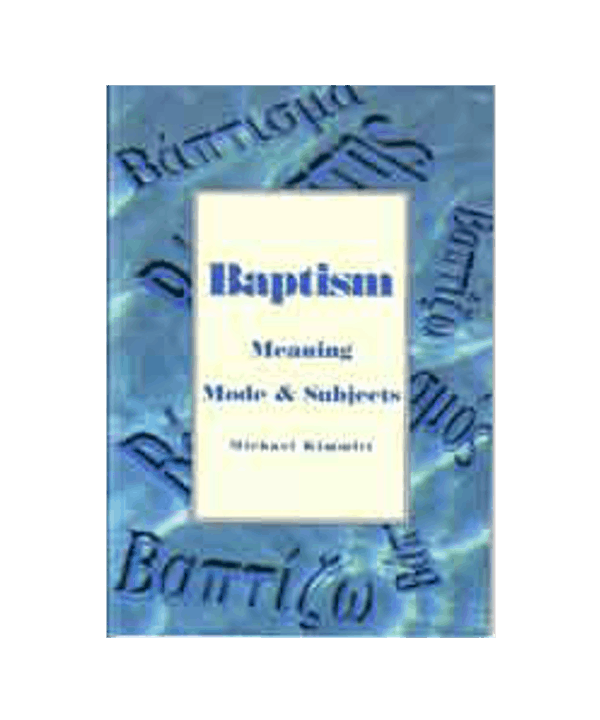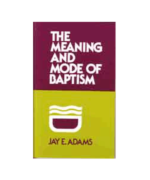This excellent booklet presents the Reformed and Presbyterian position on baptism by setting forth the various passages of Scripture dealing with this important and controversial subject. It is essentially a detailed Bible study, though the writer has drawn on a number of commentators and theologians. After considering the meaning of baptism, the main part is a thorough examination of the texts relating to mode. Not one clear example of baptism by immersion is found in the New Testament. Indeed, the circumstances of text after text point to affusion or aspersion as the only possible way in which baptism could have been administered. This conclusion is strengthened by the fact that the baptism of the Holy Spirit is spoken of in terms of coming from above in pouring, and that affusions and aspersions are frequent in the Old Testament. Baptism: Meaning, Mode and Subjects concludes with a brief treatment of the covenant position of believers’ children.
Baptism: Meaning, Mode & Subjects, by Michael Kimmitt. 48 pages. [Reviewed by David J. Engelsma]
In six, brief chapters, this booklet treats of baptism’s meaning, mode, and subjects, as well as three main objections against infant baptism and certain implications of the study.
The short study of the biblical doctrine of baptism is especially helpful regarding the mode of baptism, whether immersion or some other mode, e.g., sprinkling. Mr. Kimmitt takes a “scientific approach” to the subject, examining all of the references to baptism in the New Testament, in order then to draw the conclusion demanded by the evidence. His study shows that not only is there a complete lack of evidence in the New Testament for the dogma of immersion, but also in most of the instances of baptism immersion is improbable and often impossible. “… there is not a single certain case of immersion in the New Testament and that the probability in case after case is that Baptism was administered by sprinkling or pouring” (p. 33).
This bears, of course, on the issue of the baptism of the infants of godly parents, since immersion rules out the baptism of infants.
A scientist himself, Mr. Kimmitt has the scientist’s appreciation for mathematics: “Mathematics is a marvellous science; the one exact science we have” (p. 15). A theologian may be forgiven for demurring at this point. Nevertheless, Kimmitt intriguingly employs mathematics in the service of demonstrating that John the Baptist could not have immersed all those who came to him (pp. 14, 15).
Brief as it is, the chapter on the subjects of baptism is also very good both to confirm the faith of the Reformed Christian that infants of believers are to be baptized and to reprove the Baptist of his sin of excluding the children of the godly from the covenant and church of God.
The author carries on a controversy against the Baptists with a good spirit. But he does not minimize the seriousness of the issue: “… we invite them (all Baptists—DJE) to abandon their schismatical divisions and return to the Reformed Faith” (p. 33).
There is the greatest need for such a witness to the truth of infant baptism in the British Isles. Those with some reputation for Calvinism—the “Calvinistic Baptists”—deny infant baptism altogether, thus forfeiting the right to the name “Reformed.” Ian Paisley’s Free Presbyterian Church of Ulster has all but abandoned infant baptism, thus making a mockery of its own name. And, of course, the Anglican Church has turned infant baptism into the superstition of “christening.”
This booklet can be read on-line.
This booklet can be read on-line in Dutch, Italian and Polish. An excerpt of this booklet can also be read in Portuguese.









